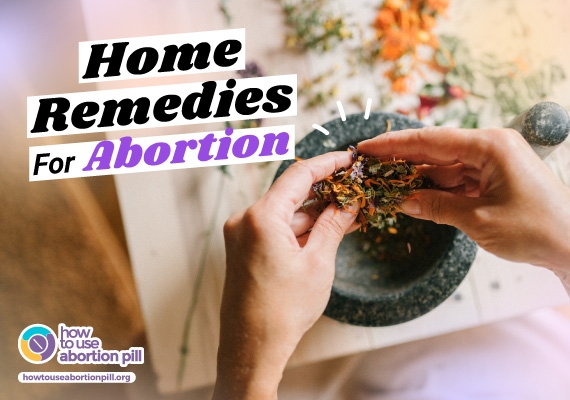When faced with an unplanned pregnancy, some people resort to home abortion. Self-managed abortions have grown popular with time but it is worthy to note that, they are only safe when undergone with medication approved by the World Health Organization (WHO).
Following the Supreme Court ban on abortions in several states in America, home remedies started gaining immense traction on one of the most used apps on social media, TikTok. For days, strange sounding herbs like mugwort, pennyroyal, blue cohosh and garnish parsley were recommended by modern herbalists on the app to terminate pregnancies. Unfortunately, these videos garnered so many views and engagement that it went viral. It is upsetting to think of the number of women who may have risked their lives to test these herbal remedies. Some creators suggested making tea with these herbs or taking them in liquid form to cause a miscarriage known as abortifacients or herbal emmenagogues.
However, medical experts warn that abortifacients are dangerous and no data exists to prove that they are safe and effective for abortion. If a miscarriage occurs while using recommended herbs, it might be as a result of a side effect on your body.
The Herbs for Abortion
PennyRoyal : One of the most commonly cited herbs is the pennyroyal, a sweet-smelling plant known for its insect repellent abilities. The oil from this plant is highly toxic and is not recommended by experts for internal use. It is popularly known for its toxic effects and tissue damage. Studies show that this plant is also directly toxic to the nervous system. Several deaths and side effects have been attributed to this herb. There is no scientific evidence for the use of this herb to; induce menstruation, undergo an abortion and to relieve PMS symptoms. Side effects of this herb include dizziness, liver and kidney toxicities, stomach upset, cramps etc. There are several reports of young women who took this herb for its abortion-inducing effects and died of multi organ failure.
Blue Cohosh : Also known as squaw root, blue cohosh is popular for its gynecological uses, It is mainly used to induce labor or abortions. Due to the questionable safety of some of the constituents of this herb, medical and herbal experts advise pregnant women to avoid it. There have been several cases of fetal abnormality associated with the consumption of this herb. None of the purported benefits of blue cohosh are scientifically proven.
Parsley : This is a popular herb that adds flavor to certain dishes. This herb has some advantages of its use to pregnant women but overconsumption may lead to fatal complications and a miscariage. Some constituents of this herb are questionable for pregnant women. Contrary to popular belief, please leave parsley for garnish. It is unsafe and has not been clinically proven to induce safe abortions. Any cases you may have heard about parsley inducing abortions may have been a side effect of using this garnish herb wrongfully. There is no scientific data to back the use of parsley for a safe abortion.
Mugwort : This herb is used as an insect repellent, occasionally an ingredient of alcohol and as treatment for some medical conditions. In its pure form, it is not considered to be highly toxic. When using it as an oil, it contains toxins that can be dangerous to the user. It was known to induce abortions back in the days. There is currently no data to support this and experts advise pregnant women to avoid resorting to its use for abortion.
It is note-worthy that even vitamins and supplements can be unsafe if taken in excess. Some abortion methods that are not WHO recommended may just be ineffective even if they do not cause any harm.
Vitamin C is an example of such medications. It may not cause any harm to the user but it is an ineffective medication for an abortion.
Some risks associated with unsafe abortions are; incomplete abortions, scarring, infection, hemorrhage, toxicity and in some cases death as a result of complications.
Some people resort to unsafe abortions due to restraints such as inability to afford medical abortion pills, proximity to a pharmacy or certified hospital, misinformation and lack of resources. These restraints are popular among young women living in under-developed areas or countries riddled with war. Around 45% of all abortions are unsafe and 97% of them occur in developing countries.
In some cases, women resort to unsafe abortion due to the restrictions placed on it. Several countries ban abortion and make sure abortion pills aren’t readily available for use by the general populace. Banning abortion doesn’t stop abortions. It only increases unsafe abortions and leads to a high mortality rate among women.
According to WHO, 73 million induced abortions occur every year. 4.7-13.2% maternal deaths are attributed to unsafe abortions.
Regardless of your location, there are several safe methods available to consider if you want to undergo an abortion. Avoid resorting to herbs and criminalized drugs that may have severe adverse effects on your body and can result in a loss of life for an abortion.
You can undergo a safe self-managed abortion in the privacy of your home by following all the processes and information provided in this video series.
Visit https://www.howtouseabortionpill.org/abortion-laws-by-country/ to learn all you can about abortions in your country and how to seek support.
Incase you undergo an abortion with a method that is not recommended by WHO and experience complications, seek medical attention immediately. Depending on its severity, you can also visit https://safe2choose.org/abortion-counseling for counselling support.
